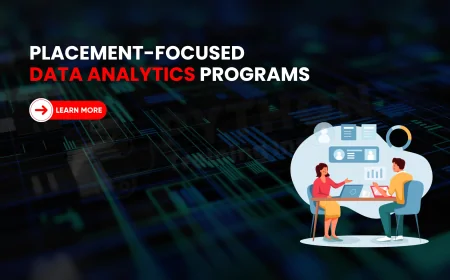Python Courses for Science Graduates in Pune | Best Python Training Programs for Science Graduates in Pune
Explore top Python courses in Pune designed for science graduates. Learn data analysis, machine learning, and automation using Python. Ideal for BSc, MSc, and non-CS students. Weekend, online, and certification options available.

Table of Contents
- Why Python is Ideal for Science Graduates
- What to Expect from Python Courses in Pune
- Career Opportunities After Python Training
- Top Python Training Institutes in Pune
- Sample Course Structure for Science Background
- Online vs Offline Python Courses
- Internship and Project Opportunities
- Python Certifications to Boost Your Career
- Course Fees and Duration
- FAQs
- Conclusion
Why Python is Ideal for Science Graduates
Python is a high-level programming language known for its readability, versatility, and vast application in scientific computing, data analysis, and artificial intelligence. For science graduates—whether from Physics, Chemistry, Biology, or Mathematics backgrounds—Python acts as a bridge to transition into tech-driven domains like Data Science, Machine Learning, Bioinformatics, and Environmental Modeling.
What to Expect from Python Courses in Pune
Python training programs in Pune tailored for science graduates often focus on:
- Fundamentals of programming logic and syntax
- Mathematical computation using libraries like NumPy and SciPy
- Data visualization using Matplotlib and Seaborn
- Basics of data analysis with Pandas
- Scientific simulations and automating experiments
- Machine Learning and AI foundations for non-programmers
Career Opportunities After Python Training
Science graduates who acquire Python skills can access a wide range of roles such as:
- Data Analyst or Data Scientist
- AI Research Assistant
- Bioinformatics Programmer
- GIS Analyst
- Lab Automation Specialist
- Environmental Data Analyst
Top Python Training Institutes in Pune
- Webasha Technologies :Is part of a growing ecosystem of reputed Python training providers in Pune.Specialized courses for non-IT backgrounds.offering tailored Python courses that emphasize foundational understanding, making it easier for career switchers and beginners to excel in coding.
Sample Course Structure for Science Background
- Introduction to Python & IDEs
- Data Types, Operators, and Variables
- Control Structures and Functions
- File Handling and Error Management
- Scientific Libraries: NumPy, SciPy
- Data Analysis & Visualization
- Introduction to Machine Learning
- Capstone Project: Scientific or Environmental Data Case Study
Online vs Offline Python Courses
Science graduates can choose based on convenience:
- Online: Flexible, accessible from home, often with lifetime access to materials.
- Offline: Ideal for structured learning, better mentorship and group study.
Many Pune-based institutes offer hybrid learning modes with weekend batches for working or postgraduate students.
Internship and Project Opportunities
Many institutes in Pune offer live projects and internships in:
- Biomedical Data Analysis
- Climate and Weather Prediction Models
- Drug Discovery Simulations
- AI in Agriculture or Environment
Python Certifications to Boost Your Career
Science graduates can enhance their resumes with certifications like:
- PCAP – Certified Associate in Python Programming
- Google IT Automation with Python
- Coursera Data Science with Python Specialization
- Python for Everybody (University of Michigan)
Course Fees and Duration
| Course Type | Duration | Average Fees |
|---|---|---|
| Beginner to Intermediate | 2–3 months | ₹10,000–₹18,000 |
| Intermediate to Advanced | 4–6 months | ₹20,000–₹35,000 |
FAQs
1. Can science graduates learn Python without any coding background?
Yes, many Python courses in Pune are tailored for absolute beginners, especially science graduates with no prior coding experience.
2. Which Python libraries are essential for science students?
NumPy, SciPy, Pandas, and Matplotlib are crucial for scientific computation and visualization.
3. What career roles can I apply for after Python training?
Data Analyst, Bioinformatics Programmer, ML Assistant, and Research Analyst are a few options.
4. Are there weekend or evening Python classes available in Pune?
Yes, most institutes offer flexible batches for working professionals and postgraduate students.
5. Will Python help in biology or chemistry-related careers?
Absolutely. Python is widely used in bioinformatics, cheminformatics, and drug discovery modeling.
6. Do I need a laptop for offline Python courses?
Some institutes provide systems, but having a personal laptop is highly recommended.
7. Can I pursue Python courses online if I’m doing MSc full-time?
Yes, online Python courses are ideal for flexible, self-paced learning alongside your degree.
8. Is project work included in Python courses?
Yes, most courses include mini-projects and a final capstone project based on real-world datasets.
9. What is the average salary after completing a Python course?
Entry-level roles offer ₹3–5 LPA, with rapid growth as you gain experience and certification.
10. Are these courses suitable for physics graduates?
Yes, Python is widely used in simulations, modeling, and data analysis in physics domains.
11. How important is Python in research?
Python enables automation, data handling, and statistical computation—crucial in modern research.
12. What type of Python certification is best for science students?
Choose PCAP or domain-specific certificates like Data Science with Python from reputed platforms.
13. Do I need math for learning Python?
Basic math helps, but you don’t need advanced math to start learning Python effectively.
14. Can Python help in pursuing a data science career?
Yes, Python is the most recommended language for data science careers worldwide.
15. Which institute in Pune is best for science graduates?
Ethans Tech, SevenMentor, and Codekul offer science-specific modules in their Python courses.
16. Is Python used in environmental science?
Yes, Python is used for weather modeling, GIS, and environmental data analysis.
17. What is the learning curve like for a non-CS student?
With structured courses, science graduates can grasp Python within 8–12 weeks.
18. Can I use Python for lab automation?
Yes, Python can be used to automate experimental workflows and data logging in labs.
19. How long does it take to get job-ready with Python?
Typically 3–6 months of consistent training and projects can make you job-ready.
20. Do I need to learn other languages with Python?
Python alone is enough for most roles, but learning SQL or R can be complementary in data fields.
Conclusion
Python has become an indispensable tool for science graduates seeking tech-driven career transformations. Whether you're aiming for a job in data analytics, research automation, or machine learning, Python offers you the foundation to build impactful solutions. Pune, being a growing educational and IT hub, offers diverse training options tailored for science backgrounds. Make the most of the learning ecosystem and step confidently into the future with Python skills.
What's Your Reaction?
 Like
0
Like
0
 Dislike
0
Dislike
0
 Love
0
Love
0
 Funny
0
Funny
0
 Angry
0
Angry
0
 Sad
0
Sad
0
 Wow
0
Wow
0












